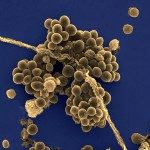Lien vers Pubmed [PMID] – 22432704
Microb. Drug Resist. 2012 Jun;18(3):286-97
Rapid adaptation to changing environments is key in determining the outcome of infections caused by the opportunistic human pathogen Streptococcus agalactiae. We previously demonstrated that the RofA-like protein (RALP) regulators RogB and Rga activate their downstream divergently transcribed genes, that is, the pilus operon PI-2a and the serine-rich repeat encoding gene srr1, respectively. Characterization of the Rga regulon by microarray revealed that the PI-2a pilus was strongly controlled by Rga, a result confirmed at the protein level. Complementation experiments showed that the expression of Rga, but not RogB, in the double ΔrogB/Δrga mutant, or in the clinical strain 2603V/R displaying frameshift mutations in rogB and rga genes, is sufficient to restore wild-type expression levels of PI-2a pilus and Srr1. Biofilm formation was impaired in the Δrga and Δrga/rogB mutants and restored on complementation with rga. Paradoxically, adherence to intestinal epithelial cells was unchanged in the Δrga mutant. Finally, the existence of several clinical isolates mutated in rga highlights the concept of strain-specific regulatory networks.





